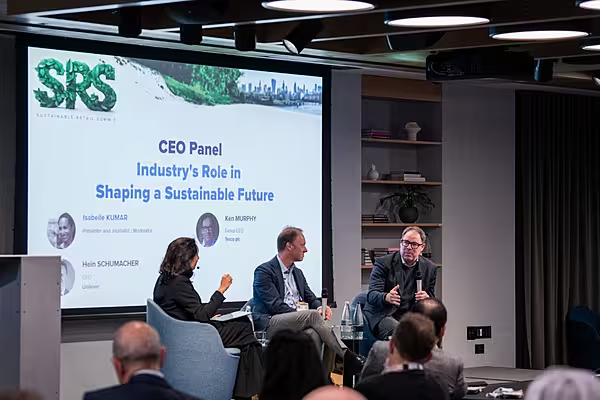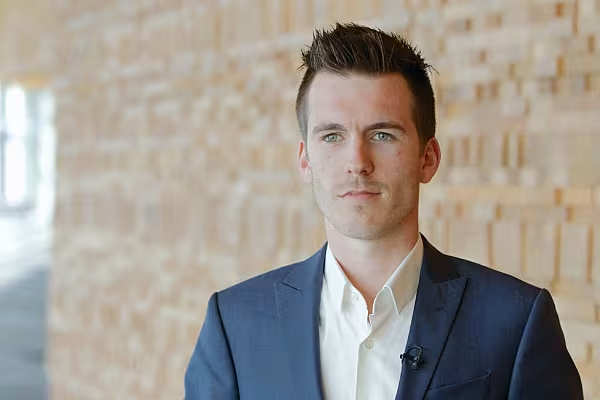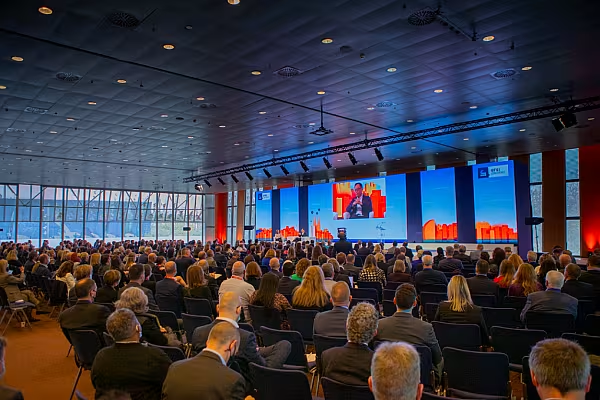The fourth annual Consumer Goods Forum Sustainable Retail Summit kicked off in Berlin yesterday, with more than 300 top-level executives from across the retail and FMCG landscape in attendance, a new record for the event.
As the Forum's managing director Peter Freedman noted in his opening address, the year has been a game-changer in terms of consumer attitudes to positive change, with Greta Thunberg and the climate movement challenging not just those in the room, but "all 7.5 billion of us that share this planet".
Olaf Koch, CEO of Metro, echoed this sentiment, when he called on delegates to do the right thing and work together – as he put it, "you don't want somebody to say to you, ten years from now, 'what did you do?', and for you to say that you only did the minimum legal requirement".
CGF In Action
The CGF in Action session, part of the morning segment, saw the Co-Chairs of the Sustainability and Health & Wellness Steering Committees take the stage to paint a picture of the challenges facing the industry as it enters a new decade.
Isabelle Grosmaitre, Danone, and Marcus Osborne, Walmart, highlighted the need for new business practices to be implemented to "transform at scale" solutions to deal with health, wellness and combatting obesity, as well as daring attention to the Forum's Collaboration for Healthier Lives (CHL) initiative.
Veronika Pountcheva, who co-chairs the CGF's Sustainability Committee, encourages delegates to get involved in the CGF's work on #sustainability. #2019SRS @VPountcheva pic.twitter.com/3xKf3IzP5f
— Consumer Goods Forum (@CGF_The_Forum) October 24, 2019
Veronika Pountcheva, METRO and Christine McGrath, Mondelēz International, then spoke on the CGF’s pathway forwards on deforestation, including an analysis of where the approach failed in the past, as well as plastics and forced labour.
As McGrath put it, efforts are underway to move from a 'clean supply chain' approach, to a 'clean supplier initiative', in order to "drive a forest positive future".
Honest Truth
Solitaire Townsend, Co-founder of Futerra, then spoke on shifting consumer behaviour and trends, sharing some hard-hitting truths with delegates, noting that an increasing number of consumers want brands to be sincere, honest and transparent.
"Consumers feel they hold the responsibility to choose the right product, they feel guilty if they don't do the right thing," she told delegates, encouraging those present to dare to be honest, and share facts.
Megatrend Analysis
Health and wellness experts were again thrust into the spotlight for the first 'Megatrend' session, which took a deep dive into inspiring healthier lives and how to overcome challenges to drive change.
Moderator Tom Heap set the scene by highlighting that lifestyle choices are increasingly becoming the biggest sources and threats for disease in the developed and developing world.
Dr Lawrence Haddad, GAIN, shed insights on critical nutrition issues – as he noted, price promotions at store level are still a lot more common for unhealthy food than for healthy food – while Kieron Boyle, Guy’s and St Thomas’ Charity, and Nilani Sritharan, Sainsbury's, went on to present their learnings from their CHL UK in-store trial activations.
Megatrend 1 continues with @KieronJBoyle, Chief Executive at @GSTTCharity who shares lessons from our their partnership with @sainsburys @Tesco to improve the health of shopping baskets for lower-affluence consumers. #2019SRS #urbanhealth pic.twitter.com/SjXIb4W62i
— Consumer Goods Forum (@CGF_The_Forum) October 24, 2019
Elsewhere, Inge Erland Naesset, Norgesgruppen ASA, spoke about the role that the industry plays in influencing the choices that consumers make, and Leonie Barelds, UNICEF, highlighted the need for collaboration to ensure that children have access to nutritious, safe, affordable and sustainable diets.
"If food systems deliver for children, they deliver for all of us," Barelds explained.
Carbon Neutrality
Hein Schumacher, CEO of FrieslandCampina N.V. then spoke on the sustainability challenges facing the dairy industry to achieve carbon neutrality. Working at the primary source of the food chain - the farmers - and setting standards that are above governmental standards is essential.
Measurement and monitoring are absolutely key, he said, and we must come up with tools and systems that deliver unambiguous data. Once you measure, you can start to make progress, he stressed.
As he explained, "the definition of sustainability for a German consumer is different to that for a Dutch consumer", so clarity is essential in this regard.
Hein Schumacher from @FrieslndCampina talks to #2019SRS delegates on the importance of measurement and shifting the #dairy business model to make the #consumer part of it. pic.twitter.com/Rq2I9MWvtL
— Consumer Goods Forum (@CGF_The_Forum) October 24, 2019
Megatrend Analysis
The second Megatrend plenary session on forced labour saw social sustainability experts unpacking the pivotal issues surrounding modern slavery.
Justine Currell, Unseen UK, spoke on how modern slavery is a shared problem and reminded delegates that this was all about people. Kieran Guilbert, Thomson Reuters Foundation, then took to the stage to highlight the power of journalism in communicating about forced labour, while Irit Tamir, Oxfam, went on to speak about the local work being done by the organisation to take human suffering out of value chains.
Laura Chapman Rubbo, The Walt Disney Company, then concluded with insights from the corporate side, sharing that Disney’s consumer products business is about taking the famous characters and embodying them in physical products, but doing so while ensuring codes of conduct are being met and human rights protected.
As she explained, while Disney doesn't manufacture any products itself, it licences to 35,000 different manufacturers, "and potentially millions of workplaces" – a reminder of the challenges involved in achieving visibility in the supply chain.
Fixing Food
The final keynote speaker of the day, Dr. Gunhild Stordalen, then spoke to delegates about EAT’s mission, its projects and partnerships, and her conviction that food can be a medicine for people and the planet. She warned that we need to radically change our diets and we have only 10 years to cut emissions by half.
Without fixing food, we stand no chance of meeting sustainable development goals, or the Paris climate agreement. We don't need more science in order to act, she concluded, we already know enough.
Dr. Gunhild Stordalen from @EATforum tells delegates that we must radically and critically change diets. We know the science - we must now get down to action. #2019SRS pic.twitter.com/P338UbcRUB
— Consumer Goods Forum (@CGF_The_Forum) October 24, 2019
Environmental Concerns
The third Megatrend then shifted the focus to tackling truths and dispelling the myths around the environment. Cristianne Close, WWF, began by framing the general picture of how earth’s natural systems are in the red.
Etelle Higonnet, Mighty Earth, went on to note that companies are doing good things, but we are far from where we need to be.
"Joint industry action works," she explained, "as it denies bad actors the chance to fall through the cracks."
Kevin Rabinovitch, Mars, Incorporated, then looked back on the CGF Resolution and the learnings we have had over the last few years, before highlighting the new pathway CGF members are now exploring. Veronika Pountcheva, METRO, then commented on this new theory of change and how the group is optimistic it will deliver if we have the right checks and balances in place.
Waste Management
Pablo Montoya Dávila, Grupo Exito, then spoke on his company’s approach to food waste and waste management in Colombia before Emma Chow, Ellen MacArthur Foundation, spoke on the linear economy and the need to transform.
She said we need to go beyond optimisation of the current linear approach: we need to tackle the underlying systemic issues, and we need a circular economy.
Concliding proceedings, Eva Dalenstam, from the EU Commission, then went further into closing the loop, sharing the EU Commission's goal for a green deal for Europe, while Ryuji Nomura, Kirin Holdings Company, Limited, concluded the session by examining PET bottle collection and recycling in Japan.
© 2019 European Supermarket Magazine – your source for the latest retail news. Click subscribe to sign up to ESM: The European Supermarket Magazine.



















